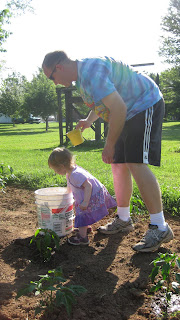
This morning Kate and I ventured out to the Farmer's Market here in Rutherford County at the Lane Agri-Park. We usually go on Tuesdays, but last week there were only a handful of vendors and very little produce offerings. Fridays are definitely a much better day to go! Today, there were three vendors selling grass-fed, organic beef; one selling grass-fed beef, chicken and pork; one selling goat cheese; and numerous vendors selling a variety of "in season" fruits and vegetables including beets, sugar snap peas, green beans, Early Girl tomatoes, lettuce mixes, squash, onions, carrots, and leeks. Plus, there are Amish vendors selling jams, jellies, relishes, breads and other pastries and farmers selling beautiful flowers, herbs, and other plants. Needless to say, Kate and I had a blast and learned a lot about the items local farmers are growing and producing here.
Today, we purchased three Early Girl tomatoes that will be ripe in a few days (DELICIOUS!), two Zephyr squash (beautiful, yellow and green-colored), a lovely red cabbage, and a tub of herb-flavored goat cheese made in Franklin, TN. We spent a little more than we would at the grocery store, but I feel good knowing the veggies are all organic with no chemicals and locally produced. I would have bought more produce but I won't be home much this weekend.
I plan to purchase most of our produce at the Farmer's Market until our garden yields its surplus of squash, zucchini, cucumbers, tomatoes and peppers. Here are some pictures of Daniel and Kate watering the plants in our garden. Kate is such a cute little shadow who spills more water on the ground and herself than on the plants, but we believe that her involvement in gardening will help her learn about produce: where veggies come from and how to grow and tend them. Such hands-on experience will help her develop an appreciation for what farmers do and hopefully one day she will grow her own veggies.

